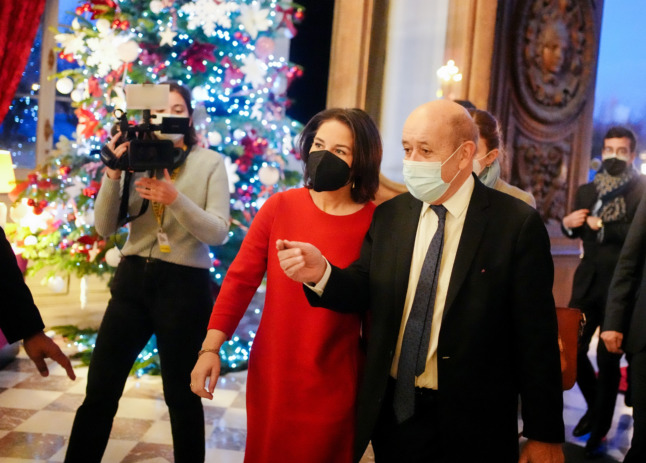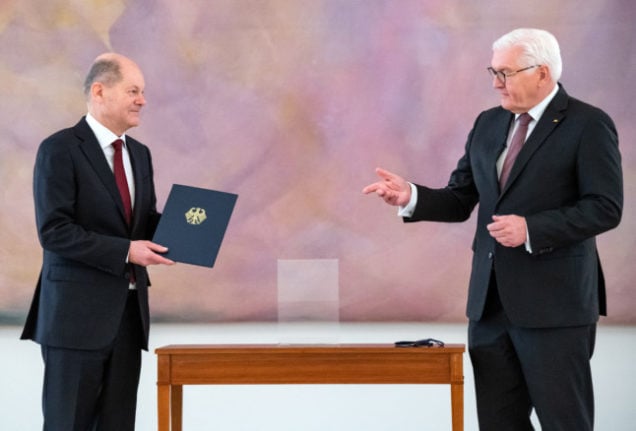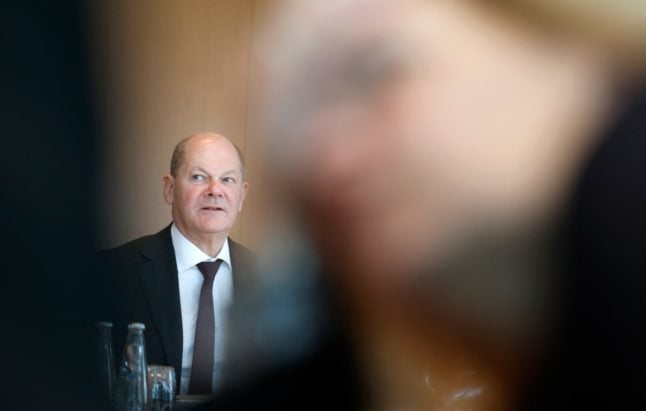After a ceremony-laden day marking the handover from Angela Merkel, Scholz is due to sit down with regional leaders of Germany’s 16 states to discuss whether further curbs are needed to stop runaway Covid infections.
With intensive care beds filling up and new variant Omicron adding to fears, Scholz’s coalition of his Social Democrats, the ecologist Greens and the liberal FDP was already dragged into fighting the pandemic before being sworn in.
Underlining the “deadly serious” situation, German President Frank-Walter Steinmeier had during Wednesday’s investiture ceremony pointedly urged Scholz to “ensure that the pandemic does not keep us firmly in its grip for another year”.
Scholz, 63, has already called for Germany to follow Austria’s example and introduce mandatory jabs, pushed by Germany’s stagnating inoculation rate.
But he may have many more tough decisions to make.
Scholz “stands before a difficult chancellorship”, said the Tagesspiegel daily, noting that the pandemic was not just a epidemiological emergency but also leading to bitter divisions in society.
READ ALSO: Five challenges facing Germany’s new government
“Debates are being conducted in an adamant fashion, camps are being formed that are hardly building any bridges to others,” it said, noting that it “would come down to the chancellor” to resolve the bitter divides.
While staying at home to fight the major fire, Scholz will also be taking his first step onto the world stage, via a virtual Summit for Democracy organised by the United States.
‘Lynchpin’
Scholz is no stranger to the diplomatic circuit, having been state premier of Hamburg when the city played host to the G20 summit and also having served as finance minister in Merkel’s cabinet over the last four years.
While he has pledged continuity, international observers will be closely watching for any shifts in tone given the switch from a conservative led government after 16 years to a centre-left-led alliance.
Scholz will head to Paris on Friday for his first official visit, where he is to meet France’s President Emmanuel Macron.
He will then travel on to Brussels for talks with EU leaders and NATO chief Jens Stoltenberg.
But ahead of him, his Foreign Minister Annalena Baerbock of the Greens was already making her debut appearances in both key European capitals on Thursday.
“Europe is the lynchpin for our foreign policy,” Baerbock said in a statement. “We will not seek to pursue our ideas and interests… at the cost of” Germany’s neighbours, she added.
Baerbock, who is Germany’s first woman foreign minister, has pledged to take a tougher line with authoritarian states like Russia and China after the business-driven pragmatism of Merkel’s era.

Annalena Baerbock is greeted by French Foreign Minister Jean-Yves Le Drian on a trip to Paris on Thursday. Photo: picture alliance/dpa | Kay Nietfeld
And the first signs of friction within the freshly minted government could well arise from here, as Scholz has so far taken a cautious tone on issues such as the US’ diplomatic boycott of the Winter Olympics in Beijing.
Even as Baerbock was about to embark on her trips, Scholz appeared to assert his authority over her portfolio.
Asked at a TV interview on Wednesday if Baerbock or he will determine foreign policy, Scholz said that “we will act together as a government – and that starts with the head of government”.
That may appear obvious. But as Spiegel noted, “given the differing views within the coalition, the statement is significant”.
READ ALSO: OPINION: Scholz won’t revolutionise Germany – but change is welcome after Merkel
By Hui Min Neo



 Please whitelist us to continue reading.
Please whitelist us to continue reading.
Member comments